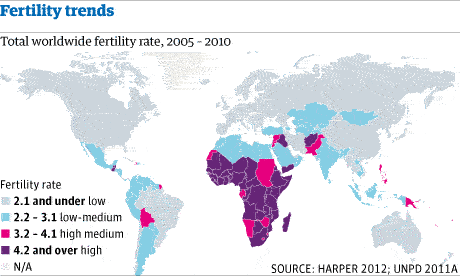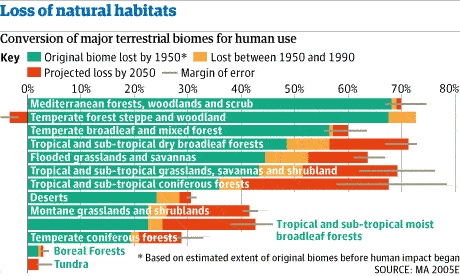World population needs to be stabilised quickly and high consumption in rich countries rapidly reduced to avoid "a downward spiral of economic and environmental ills", warns a major report from the Royal Society.
Contraception must be offered to all women who want it and consumption cut to reduce inequality, says the study published on Thursday, which was chaired by Nobel prize-winning biologist Sir John Sulston.
The assessment of humanity's prospects in the next 100 years, which has taken 21 months to complete, argues strongly that to achieve long and healthy lives for all 9 billion people expected to be living in 2050, the twin issues of population and consumption must be pushed to the top of political and economic agendas. Both issues have been largely ignored by politicians and played down by environment and development groups for 20 years, the report says.
"The number of people living on the planet has never been higher, their levels of consumption are unprecedented and vast changes are taking place in the environment. We can choose to rebalance the use of resources to a more egalitarian pattern of consumption ... or we can choose to do nothing and to drift into a downward spiral of economic and environmental ills leading to a more unequal and inhospitable future", it says.
At today's rate of population increase developing countries will have to build the equivalent of a city of a million people every five days from now to 2050, says the report. "Global population growth is inevitable for the next few decades. By 2050, it is projected that today's population of 7 billion will have grown by 2.3 billion, the equivalent of a new China and an India."
But the sheer number of people on earth is not as important as their inequality and how much they consume, said Jules Pretty, one of the working group of 22 who produced the report. "In material terms it will be necessary for most developed countries to abstain from certain sorts of consumption, such as CO2. You do not need to be consuming so much to have a long and healthy life. We cannot conceive of a world that is going to be as unequal as it is now. We must bring the 1.3 billion people living on less than a $1.25 a day out of absolute poverty. It's critical to slow population growth in those countries which cannot keep up with services."
The report gives the example of Niger in West Africa which has increased life expectancy in the past 30 years but is doubling population every 20 years. "Even assuming its total fertility rate (Tfr) falls to 3.9 by 2050, which may be optimistic, the population will grow from 15.5 to 55.5 million by 2050. A future in which population increase outstrips the production of food and other necessities of life is a real possibility for Niger. It is difficult to see a bright future for the country without sharp reductions in fertility and population growth together with increased investment in health and education," it said.

Most of the global population growth in the next century will come from the 48 least developed countries, of which 32 are in Africa, said Ekliya Zulu, one of the authors and president of the Union for African Population studies. "Taking Africa alone, the population will increase by 2 billion this century. If we fail and fertility levels do not go down to 2.1, (from 4.7 now) the population [there] may reach 5.3 billion. When we slow down population growth we empower women and provide more money for least developed countries to invest in education. The majority of women want fewer children. The demand to reduce fertility is there", he said.
The authors acknowledge that it would take time and massive political commitment to shift consumption patterns in rich countries, but believe that providing contraception would cost comparatively little. "To supply all the world's unmet family planning needs would be $6-7bn a year. It's not much. It's an extremely good investment, extremely affordable. To not provide family planning is an infringement of human rights", said Sulston.
The authors declined to put a figure on sustainable population, saying it depended on lifestyle choices and consumption. But they warned that without urgent action humanity would be in deep trouble. "The pressure on a finite planet will make us radically change human activity", said Pretty.
"The planet has sufficient resources to sustain 9 billion, but we can only ensure a sustainable future for all if we address grossly unequal levels of consumption. Fairly redistributing the lion's share of the earth's resources consumed by the richest 10% would bring development so that infant mortality rates are reduced, many more people are educated and women are empowered to determine their family size – all of which will bring down birth rates", said an Oxfam spokeswoman.


